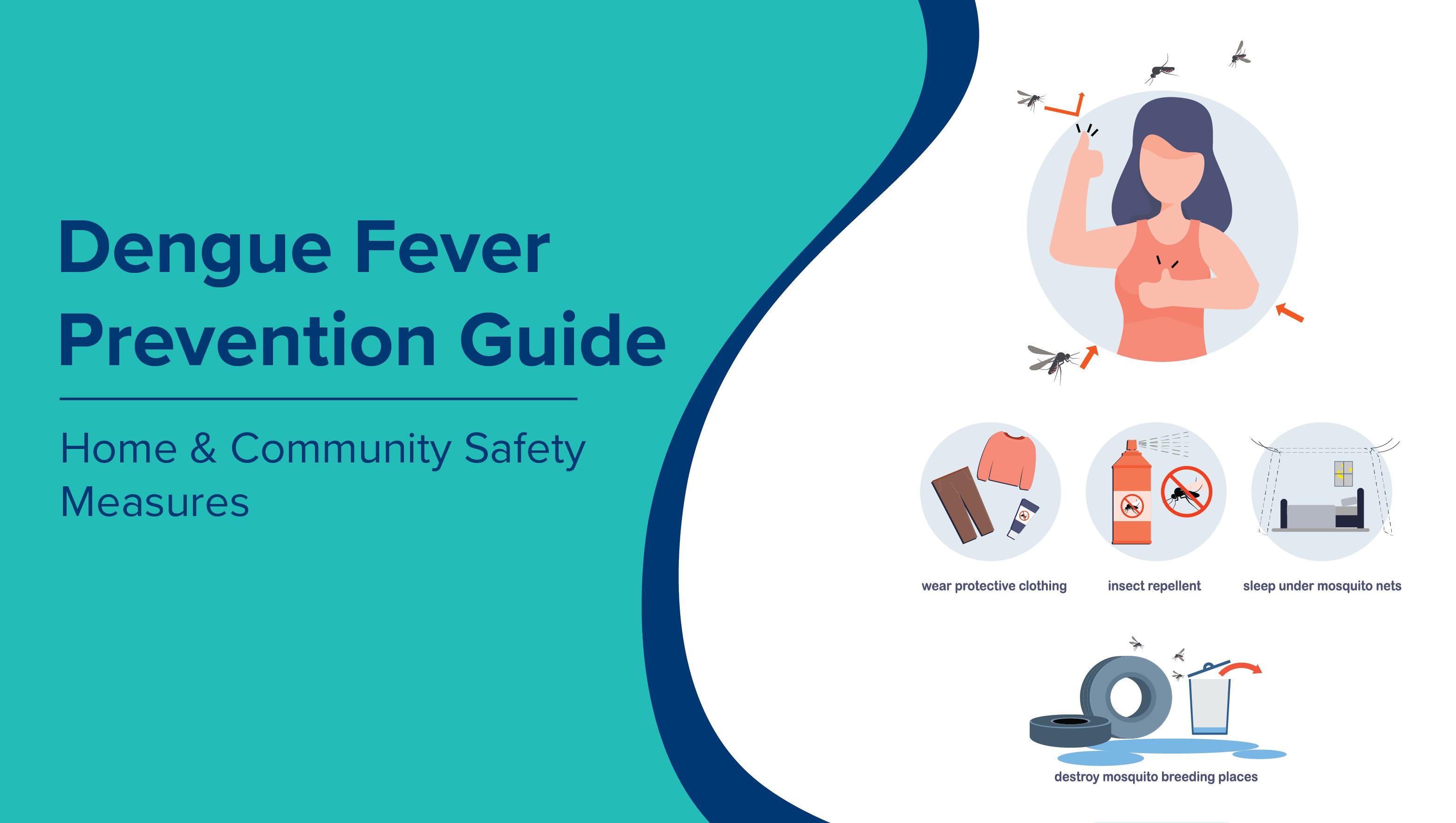Why Dengue Prevention Matters
Dengue fever has become a growing public health concern in India, with cases rising steadily, especially during the monsoon and post-monsoon months. Transmitted through the bite of infected Aedes mosquitoes, dengue can range from mild flu-like symptoms to severe complications that may require urgent medical care. With no specific cure available, prevention remains the most effective strategy to protect individuals, families, and communities. Simple measures such as avoiding mosquito bites, eliminating breeding sites, and staying alert to early symptoms can significantly reduce the risk of infection. Understanding why prevention is crucial lays the foundation for learning how to avoid dengue and safeguard both personal and community health.
Understanding Dengue and Its Causes
Dengue is a viral infection transmitted to humans through the bite of female Aedes aegypti mosquitoes, which are most active during the early morning and late afternoon. The virus enters the bloodstream after a mosquito bite and can cause symptoms such as high fever, severe headache, body pain, and in some cases, serious complications like dengue hemorrhagic fever. The spread of dengue is closely linked to environmental and lifestyle factors, with common causes including:
-
Bites from Aedes aegypti mosquitoes that carry the dengue virus
-
Breeding of mosquitoes in stagnant water, such as buckets, flower pots, or discarded containers
-
Higher risks in densely populated urban and semi-urban areas
-
Increased mosquito activity during the monsoon season due to water accumulation
Symptoms of Dengue You Should Not Ignore
Recognizing dengue symptoms at an early stage is crucial for timely treatment and to avoid complications. The illness can range from mild to severe, so knowing the warning signs is important for seeking timely medical care.
Common symptoms include:
-
Sudden high fever
-
Severe headache
-
Skin rash
-
Nausea or vomiting
Severe symptoms requiring hospitalization include:
-
Persistent vomiting
-
Intense abdominal pain
-
Bleeding from the gums or nose
-
Rapid breathing or shortness of breath
-
Extreme fatigue or restlessness
-
Sudden drop in platelet count
If any severe signs appear, immediate medical attention is essential to manage dengue effectively.
Importance of Platelet Count in Dengue
One of the most critical concerns in dengue fever is the sharp decline in platelet levels, which play a vital role in blood clotting and preventing bleeding. The dengue virus suppresses bone marrow function and destroys platelets, leading to an increased risk of complications.
-
Normal platelet range: 1.5 to 4.5 lakh per microlitre of blood
-
Low platelet levels: Below 1.5 lakh per microlitre, with a higher risk of bleeding when levels fall below 50,000
Monitoring platelet count regularly is essential in suspected or confirmed dengue cases. A Platelet Count Test helps track levels and determine whether urgent medical care or hospitalization is required.
Along with medical care, certain foods and home remedies may help support recovery, such as papaya leaf extract, citrus fruits, pomegranate, and adequate hydration. However, these should be considered as supportive measures, not replacements for proper treatment and medical supervision.
Dengue Prevention Tips at Home
Preventing dengue at home is one of the most effective ways to protect yourself and your family from the virus. Simple daily habits can significantly reduce the risk of mosquito bites and dengue infection.
-
Keep your surroundings clean and free of stagnant water where mosquitoes can breed.
-
Use mosquito repellents, coils, or nets to prevent bites, especially during peak mosquito activity hours.
-
Install window and door screens to keep mosquitoes out of living spaces.
-
Wear full-sleeve clothing and long pants to minimize exposed skin, particularly during early morning and late afternoon.
By adopting these measures consistently, you can create a safer home environment and lower the risk of dengue infection.
Community-Level Dengue Prevention
Dengue prevention is most effective when communities work together to reduce mosquito breeding and raise awareness about the disease.
-
Conduct regular fogging and spraying in public areas to control mosquito populations.
-
Ensure proper waste disposal to prevent water accumulation in discarded containers, tires, and other debris.
-
Organize community awareness drives to educate residents about dengue symptoms, preventive measures, and the importance of early testing.
Collective efforts at the community level can significantly reduce the risk of dengue outbreaks and protect public health.
How to Prevent Dengue Mosquito Breeding?
Preventing dengue starts with controlling mosquito breeding around your home and community. Simple, consistent actions can drastically reduce the risk of infection.
Remove Stagnant Water
Empty flowerpots, old tires, buckets, and any unused containers that can collect water, as these serve as ideal breeding sites for Aedes mosquitoes.
Clean Water Containers
Regularly clean and scrub water storage containers, tanks, and coolers to prevent mosquito larvae from developing.
Secure Water Storage
Cover tanks, jars, and vessels properly to ensure mosquitoes cannot access standing water.
Manage Gutters and Drains
Keep gutters and drains free-flowing to avoid waterlogging, which can create breeding grounds.
Properly Dispose of Waste
Dispose of discarded items such as plastic bottles, cans, and broken containers to prevent rainwater accumulation and eliminate potential mosquito breeding sites.
By following these preventive steps, households can effectively minimize mosquito breeding and lower the chances of dengue transmission.
Diet and Immunity for Dengue Prevention
A strong immune system plays a key role in protecting the body from infections, including dengue. Including certain foods and maintaining proper hydration can help support immunity, especially during the monsoon season when mosquito activity is high.
-
Immunity-boosting foods: Papaya leaf extract, citrus fruits like oranges and lemons, pomegranate, and green leafy vegetables can help strengthen the immune response.
-
Fluids: Drink plenty of water, coconut water, and natural fruit juices to stay hydrated and support overall health.
A balanced diet combined with preventive measures against mosquito bites can significantly reduce the risk of dengue infection.
Dengue Prevention for Kids and the Elderly
Children and the elderly are more vulnerable to dengue due to weaker or developing immune systems, making extra precautions essential.
-
Use child-safe mosquito repellents and natural alternatives to protect young ones from bites.
-
Ensure protective clothing such as full-sleeve shirts, long pants, and hats to minimize exposed skin.
-
Keep living spaces secure with window screens, mosquito nets, and clean surroundings to reduce mosquito exposure.
Taking these steps helps safeguard vulnerable groups from dengue while maintaining comfort and safety at home.
Importance of Dengue Testing for Early Detection
Early detection of dengue is crucial for effective management and to prevent complications. Timely blood testing helps confirm the presence of the virus, monitor disease progression, and guide appropriate treatment. Tests such as Dengue NS1 Antigen, Dengue IgM, and Dengue IgG provide accurate insights into the stage of infection and immunity status.
For convenience and safety, you can book your Dengue Blood Test at Home with MaxAtHome to get quick and reliable results without visiting a clinic, ensuring timely monitoring and care.
Myths and Facts About Dengue Prevention
Understanding the truth behind common beliefs about dengue helps in taking effective preventive measures.
- Can papaya leaves cure dengue?
Papaya leaf extract may help support platelet levels, but it is not a cure for dengue. Proper medical care and monitoring remain essential.
- Do all mosquitoes spread dengue?
No, only female Aedes mosquitoes, primarily Aedes aegypti and Aedes albopictus, are responsible for transmitting the dengue virus.
- Does dengue spread from person to person?
Dengue is not directly contagious between people. It spreads when a mosquito bites an infected person and then bites a healthy individual.
Being aware of these facts ensures that preventive efforts are focused on scientifically proven methods rather than myths.
When to Seek Medical Help
Early recognition of severe dengue symptoms can prevent complications and save lives. Seek immediate medical attention if you notice:
-
Persistent high fever
-
Severe abdominal pain
-
Continuous vomiting
-
Bleeding from gums or nose
-
Rapid breathing or shortness of breath
-
Extreme fatigue or restlessness
-
Sudden drop in platelet count
Importance of timely testing and treatment:
-
Ensures close monitoring of disease progression
-
Helps manage symptoms effectively
-
Reduces the risk of serious or life-threatening complications
-
Improves chances of faster and safer recovery
Stay Safe and Stay Informed
Dengue prevention relies on a combination of personal, household, and community measures. Keeping your surroundings clean, eliminating stagnant water, using mosquito repellents, wearing protective clothing, and maintaining a healthy diet can significantly reduce the risk of infection. Staying informed, practicing preventive measures consistently, and participating in community awareness initiatives are key to protecting yourself, your family, and your community from dengue. Early detection through timely testing ensures effective monitoring and care, and services like MaxAtHome make it convenient to get tested at home. For quick and reliable at-home testing or guidance, you can reach us at 9240299624.
FAQs
What are the best ways to prevent dengue at home?
Keep your surroundings clean, eliminate stagnant water, use mosquito repellents, wear protective clothing, and install screens on windows and doors to reduce mosquito exposure.
How can I protect my children from dengue?
Ensure children wear full-sleeve clothing, apply child-safe mosquito repellents, and avoid areas with standing water or high mosquito activity.
Can mosquito repellents effectively protect against dengue?
Yes, mosquito repellents can help prevent bites, but they should be used along with other preventive measures such as nets, screens, and eliminating breeding sites.
What foods help in dengue prevention and recovery?
Immune-boosting foods like citrus fruits, papaya leaf extract, green leafy vegetables, and plenty of fluids support overall health and recovery.
Which mosquito spreads dengue?
Dengue is primarily transmitted by the Aedes aegypti mosquito, which bites during the day and breeds in stagnant water.
How does dengue mosquito breeding occur?
Aedes mosquitoes lay eggs in stagnant or slow-moving water, such as flowerpots, buckets, gutters, and discarded containers.
How long is a dengue mosquito bite infectious?
A mosquito that bites an infected person can transmit the virus for its lifespan, which is usually up to several weeks, depending on environmental conditions.
Can dengue be prevented through vaccination?
Vaccines are available in some regions for individuals with a prior dengue infection, but they are not universally recommended for all age groups. Testing, such as Dengue IgG or NS1 Antigen, can confirm past or current infection and help determine whether vaccination is appropriate.”
Is there a dengue vaccine available in India?
Yes, certain dengue vaccines are approved in India, but they are generally recommended only for individuals with a confirmed previous dengue infection. It is important to consult a doctor before vaccination to ensure it is safe and appropriate for you.
How can schools and offices prevent dengue?
Schools and offices can reduce the risk of dengue by maintaining regular cleaning, eliminating stagnant water, implementing mosquito control measures, and educating staff and students about preventive practices. Additionally, timely dengue testing can help with early detection and prompt management, ensuring a safer environment for everyone.
What preventive measures does the government take against dengue?
Government efforts include public awareness campaigns, fogging and spraying in affected areas, proper waste management, and monitoring mosquito breeding hotspots. Additionally, promoting timely dengue testing using NS1 Antigen, Dengue IgM, Dengue IgG, Platelet Count Test, Blood Test, and Fever Test helps with early detection and containment, supporting broader public health measures.
What are the early symptoms of dengue fever?
Common early symptoms include high fever, severe headache, joint and muscle pain, rash, nausea, and fatigue. Timely testing is crucial for proper care.















